The phone, sunlight and sound sleep. By Marc Sorenson, EdD. 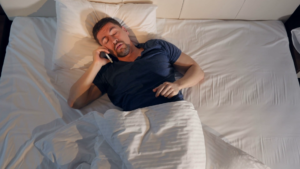
The phone is ubiquitous, and it may be taking away a basic human need: sound and restful sleep.
How should the sleep/wake cycle work?
First of all, we awake to bright sunshine. Light enters the eye and stimulates serotonin production. Serotonin is a natural “upper” and mood elevator. Thus, we quickly become awake and invigorated. The bright sunshine also suppresses melatonin, the sleep inducer. Yet at evening light disappears (at least that is how nature intended it), melatonin levels rise, and serotonin levels diminish. We begin to feel sleepy and ideally retire for a good night’s rest. It is a perfect system for our needs—unless we stay up beyond biologically natural hours by using artificial lighting.
Then, the phone throws a wrench into the works!
Particularly, a phone, tablet, computer monitor and other electronic device that emits blue light can interfere with sleep cycles. This may leave you wide-awake and staring at the ceiling when you should be sleeping peacefully. Furthermore, you may feel “out of sync” the next day due to lack of rest. We hear a plethora of advice about using blue-blocker screens, and heaven forbid, giving up the devices at night! Regrettably, however, some humans would rather die than not check their devices just before, and many times during, bedtime. Perhaps they are incorrigibly addicted to the phone, tablet, etc. In addition, such activities inhibit melatonin secretion. Best to eschew the phone by night and embrace the sun by day!
So, is there any way to cater to our phone addictions and still get some shut-eye?
An interesting study showed that exposure to constant bright light, for several hours daily, stopped sleeplessness and let melatonin dominate at night. The researchers compared subjects reading a book (no blue light) and a tablet (lots of blue light). They also assessed sleep patterns and melatonin concentrations. Both groups had identical results for melatonin and sleep patterns. From this research, it appears that we can have our cake and eat it too, provided we receive plenty of sunlight. Most noteworthy was that it was not lack of blue light (when the devices were removed) that enhanced sleep. Rather, it was the bright light exposure in the day. Hence, we can evade sleep-deprivation punishment for 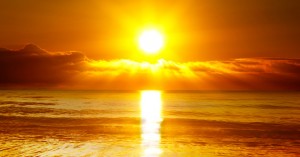 excessive device use if we take our time in the sunlight!
excessive device use if we take our time in the sunlight!
So is there other research indicative of the night-time-sleep-inducing effects of daytime sun exposure?
There are several. For a full discussion, I suggest you read my book, Embrace the Sun, co-authored by Dr. William Grant.
Another investigation established that people whose workplaces have windows are able to sleep about 46 minutes per night longer on average, than those who have no natural light access. Those with windows also are generally happier, have fewer ailments, and experience better vitality than their window-less counterparts.
Why is sleep so important to health, regardless of cell phone, sunlight, etc.?
Another article shows that too little sleep can be deadly. Forbes Magazine online printed an excellent article on sunlight and sleep, which listed the following horrendous statistics: “In 2012, 60 million Americans filled prescriptions for sleeping pills, up from 46 million in 2006.” The article discusses the potential dangers of sleep medications, showing that those who take 18 sleeping pills per year have a tripling of the risk of death compared to those who take fewer than 18.
Do not expect the drug companies to be touting these stats. Take matters in your own hands and get some daily, non-burning sun exposure. In addition, read Embrace the Sun,
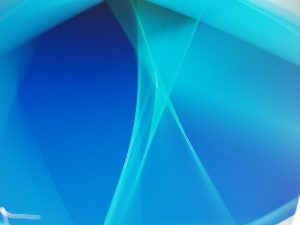 What is blue light?
What is blue light?
Blue light is a light spectrum, emitted by the sun. It also emitted by technology devices and therefore has fallen into disrepute. First of all, blue light in the evening (typical with TV/Computer/Cellular phones) is not healthful. It is especially relevant that it inhibits melatonin, which is needed for sound sleep.[1] [2] Hence, we are warned about the deleterious effects of using our phone, tablets, TVs and computer late at night.
Is blue light both good and bad?
In addition, melatonin has anti-cancer properties.[3] However, while blue light exposure reduces evening melatonin (bad), it also inhibits melatonin production during the day (good). Why? Because melatonin lets the body relax and sleep. That is the last thing we want by day, because we should be alert and working. Blue light, while reducing melatonin at night, is wonderful by day. Another positive effect is its ability to call T-cells (important immune-system cells) into play.[4] And of course, T-cells are soldiers that can destroy noxious, invading microorganisms.
What more can blue light do?
In addition, full–body exposure to blue light decreases blood pressure, lessens arterial stiffness, and improves endothelial function.[5]
Another attribute is its ability to cause subdermal fat tissue to decrease in size.[6] In other words, it can cause fat loss. Thus, the action of sunlight may help one to stay slim or become slim. The researchers showed that daily exposure of fat cells to blue light resulted in decreased lipid droplet size and increased fat breakdown rate. The researchers had been doing research on light and diabetes, and they serendipitously found that the light could be an asset in maintaining (or producing) a slim body.
Set your circadian rhythm.
Blue light also helps to reset the circadian rhythm of the body.[7] In conclusion, remember that blue light, which is particularly beneficial during the daytime, is disruptive at night and inhibits melatonin, needed for sleep. Therefore, get out in the early morning and get your share of blue light throughout the day. And when it becomes dark, go to bed early and avoid blue light. Avoid sunburn when you are soaking up the sun. Simply cover up when you have had enough, and avoid sunscreens, which have been shown to actually increase sunburning.
Learn more!
To learn all the facts about the healthful effects of sunlight, read my book, Embrace the Sun, available at Amazon. https://www.amazon.com/Embrace-Sun-Marc-B-Sorenson/dp/069207600X 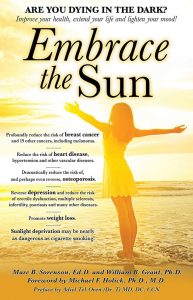
[1] Vandewalle G, Collignon O, Hull J.T, Daneault V, Albouy G, Lepore F, et al. Blue light stimulates cognitive brain activity in visually blind individuals. J Cogn Neurosci. 2013 Dec;25(12):2072.
[2] Knufinke M, Fittkau-Koch L, Møst EIS, Kompier MAJ, Nieuwenhuys A. Restricting short-wavelength light in the evening to improve sleep in recreational athletes – A pilot study. Eur J Sport Sci. 2018 Nov 14:1-8. [Epub ahead of print].
[3] de Almeida Chuffa LG, Seiva FRF, Cucielo MS, Silveira HS, Reiter RJ, Lupi LA. Mitochondrial functions and melatonin: a tour of the reproductive cancers. Cell Mol Life Sci. 2018 Nov 14 [Epub ahead of print].
[4] Phan TX, Jaruga B, Pingle SC, Bandyopadhyay BC, Ahern GP. Intrinsic Photosensitivity Enhances Motility of T Lymphocytes. Sci Rep. 2016 Dec 20;6:39479.
[5] Stern M, Broja M, Sansone R, Gröne M, Skene SS, Liebmann J. et al.
[6] Ondrusova K, Fatehi M, Barr A, Czarnecka Z, Long W, et al.. Subcutaneous white adipocytes express a light sensitive signaling pathway mediated via a melanopsin/TRPC channel axis. Scientific Reports 2017 November 27;7:16332.
[7] Bonmati-Carrion MA, Arguelles-Prieto R, Martinez-Madrid MJ, Reiter R, Hardeland R, Rol MA, Madrid JA. Protecting the melatonin rhythm through circadian healthy light exposure. Int J Mol Sci. 2014 Dec 17;15(12):23448-500.
The circadian rhythm is a variation in physiology and behavior persistent with a cycle length close to 24 hours, and regular sun exposure and dark exposure are is necessary to keep the cycle intact.[1] The circadian cycle in humans is approximately 24-hours in length and must be reset on a daily basis in order to remain in synchronization with the external environment. Sun exposure at the correct times of day is exceptionally important to human health, and when the cycle is disrupted by lack of light, such as that experienced by shift workers, or by those who live constantly indoors, it leads to a feeling of being “out of sync.” Disruption of the circadian rhythm may lead to increased breast-and/or-colorectal cancer risk in women,[2] [3] and research has demonstrated that disruption of circadian rhythms may lead to a profound increase in the risk of heart disease, metabolic syndrome, lung cancer[4] and other cancers.[5] [6]
According to the Journal Sleep Health, morning daylight exposure helps to reset the circadian rhythm or properly maintain it, which leads to better sleep at night.[7] The authors and researchers used a specialized device to measure the type of light that keeps the circadian rhythm of the human body properly set. By comparing workers in different buildings for sleep quality, they determined that those who received higher levels of morning light had considerably better sleep quality. They stated this conclusion: “The present study is the first to measure personal light exposures in office workers using a calibrated device that measures circadian-effective light and relate those light measures to mood, stress, and sleep. The study’s results underscore the importance of daytime light exposures for sleep health.” See also this link: http://sunlightinstitute.org/sleep-quality-is-improved-by-exposure-to-nature-and-sunlight/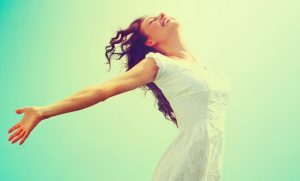
Insomnia is a terrible problem in our modern life. To a great extent, that problem could be solved by arising early and taking advantage of an hour of morning sun exposure.
Safely enjoy your sun exposure, sleep tight and improve your health!
[1] Jeanne F. Duffy, M.B.A., Ph.D. and Charles A. Czeisler, Ph.D., M.D. Effect of Light on Human Circadian Physiology. Sleep Med Clin. 2009 Jun; 4(2): 165–177.
[2] Davis S, Mirick DK. Circadian disruption, shift work and the risk of cancer: a summary of the evidence and studies in Seattle. Cancer Causes Control 2006;17:539-45.
[3] Reparto di ChirurgiaGenerale A/D, PoliclinicoSant’Andrea, Sapienza Università di Roma. [Night work as a possible risk factor for breast cancer in nurses. Correlation between the onset of tumors and alterations in blood melatonin levels]. Prof Inferm. 2007;60:89-93
[4] Papagiannakopoulos T, Bauer MR, Davidson SM, Heimann M, Subbaraj L, Bhutkar A, Bartlebaugh J, Vander Heiden MG, Jacks T. Circadian Rhythm Disruption Promotes Lung Tumorigenesis. Cell Metab. 2016 Jul26;(16)30312-2016.07.001.
[5] Vignesh Shanmugam, Amro Wafi, Nawaf Al-Taweel and Dietrich Büsselberg. Disruptions of circadian rhythm
Increase the risk of cancer, metabolic syndrome and cardiovascular disease. Journal of Local and Global Health Science, 2013:3.
[6] Bratsun DA, Merkuriev DV, Zakharov AP, Pismen LM. Multiscale modeling of tumor growth induced by circadian rhythm disruption in epithelial tissue. J Biol Phys. 2015 Aug 21. [Epub ahead of print]
[7] Mariana G. Figueiro, Bryan Steverson, MA, Judith Heerwagen, PhD, Kevin Kampschroer, MA, Claudia M. Hunter, PhD, Kassandra Gonzales, MS, Barbara Plitnick, RN, Mark S. Rea, PhD. The impact of daytime light exposures on sleep and mood in office workers. Sleep Health June 2017;3:204-215.
By Marc Sorenson, EdD: friend of the Sun.
Babies who cry at night rather than sleep can wreak havoc on the health, wellbeing and work performance of their parents, so any natural method of helping the baby to sleep well would be welcomed in most families. One of the best natural methods is to expose the baby to outdoor light, and research showed that infants who slept well were exposed to significantly more early-afternoon light than their counterparts who did not sleep well.[1] We have discussed previously in this blog that circadian rhythms are controlled to a great extent by sun or the lack thereof, and these researchers stated, “These data suggest that light in the normal domestic setting influences the development of the circadian system.” Proper circadian rhythms are also vitally important for adults, and when disrupted predict an increase in illness and death from many maladies, particularly from our number-one killer, cardiovascular disease.[2]
Melatonin, which should exhibit high levels at night, is a sleep inducer, and its production is enhanced when the lights go out at night. But, for that to happen, there must be sufficient bright light earlier in the day.
For babies or adults, here is how the system should work: When we awake to sunshine, light enters the eye and stimulates serotonin production; we then quickly become awake and invigorated, and melatonin is suppressed. At day’s end, however, the bright light disappears (or at least that is how nature intended it), melatonin levels rise, and serotonin levels diminish. We begin to feel sleepy and ideally go to bed for a good night’s rest. It is a perfect system for our needs—that is until we stay up far beyond biologically natural hours by using artificial lighting.
Is there and answer to a disrupted circadian rhythm and poor sleep quality? Yes! A paper entitled Circadian clocks optimally adapt to sun for reliable synchronization has the answer.[3] In it, the authors explain that circadian rhythms are best synchronized by sun. It therefore occurs that to escape the ravages of electric lighting, it would be a good idea to reset our biological clocks daily by being out in the morning sun and at other times, when possible, and to avoid long hours of light exposure at night. This could be one of the best therapies possible when we feel “out of synch.” And, catching some sun throughout the day would also keep serotonin levels higher and keep our moodiness in check. All of us know that we feel better when we are in the sun. This, coupled with enhancement of health, demonstrates that our friend, the sun, is an essential companion for optimal living.
So take care of your babies as nature intends, and also take care of yourself with non-burning daily sun exposure.
[1] Harrison Y. The relationship between daytime exposure to light and night-time sleep in 6-12-week-old infants. J Sleep Res. 2004 Dec;13(4):345-52.
[2] Jason Brainard, Merit Gobel, Benjamin Scott, Michael Koeppen and Tobias Eckle. Health implications of disrupted circadian rhythms and the potential for daylight as therapy. Anesthesiology. 2015 May ; 122(5): 1170–1175.
[3] Hasegawa Y, Arita M. Circadian clocks optimally adapt to sun for reliable synchronization. J R Soc Interface. 2013 Dec 18;11(92):20131018.
By Marc Sorenson, EdD, Sunlight Institute
A good, sound sleep is important to human health, both physical and mental. According to Dr. Diana Grigsby-Toussaint, “Studies show that inadequate sleep is associated with declines in mental and physical health, reduced cognitive function, and increased obesity.” She and her colleagues at the University of Illinois recently published a new study demonstrating that a natural environment may help people get the sleep they need.[1] The study showed that exposure to nature, which they dubbed “greenspace,” was associated with a more restful sleep. Other surroundings such as a sandy beach with an ocean view were also conducive to better sleep. One of the measurements used to qualify an area as greenspace was the availability of sunlight.[2]
I can attest to the fact that when I regularly walk through the pines and aspens located in the high mountains near my Nevada ranch, I sleep better at night. When I don’t get enough outdoor time in the trees and sunlight, I begin to suffer from what my friend, Dr. William Grant, calls nature-deficit disorder, or NDD. My whole mood is altered, and not for the better. Dr. Grant is not only a great sunlight scientist, but an avid birdwatcher, which takes him out daily do get his dose of nature.
We have a primal need for sunlight and natural surroundings, and too many city dwellers do not connect with sunlight and nature. Don’t fall into that trap. There is an adage that says, “What gets scheduled gets done.” Plan to be outside as often as possible and soak up some sun when it is available. Natural surroundings with sunlight are better than any psychiatrist or physician for maintaining mental and physical health.
[1] Grigsby-Toussaint DS, Turi KN, Krupa M, Williams NJ, Pandi-Perumal SR, Jean-Louis G. Sleep insufficiency and the natural environment: Results from the US Behavioral Risk Factor Surveillance System survey. Prev Med. 2015 Sep;78:78-84.
[2] http://news.aces.illinois.edu/news/u-i-study-men-people-over-65-sleep-better-when-they-have-access-nature.
